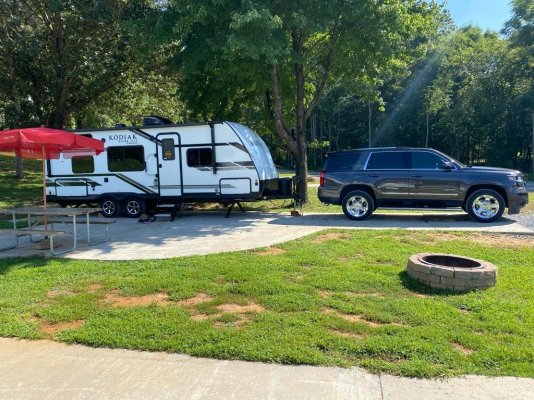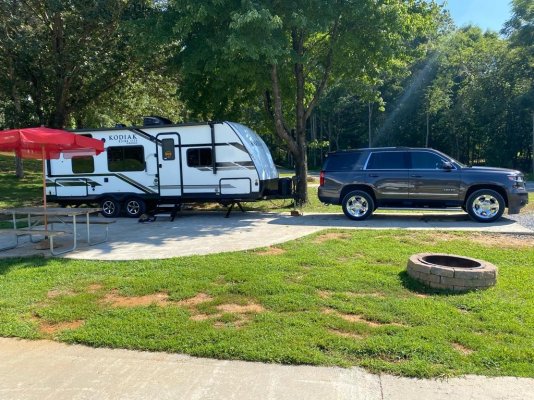bruce kelly
TYF Newbie
- Joined
- Sep 14, 2017
- Posts
- 2
- Reaction score
- 0
Some comments about pulling trailers over 40 years and 100K miles.
1. set up the spring bars on the hitch (I had a Reese) so both bumpers go down about the same amount. The spring bars will seem unreasonably tight and will protest with turns and going into driveways. Put some grease on the pivots for the bars. My tow vehicle (suburban or Yukon XL) did not have load leveling feature, I would turn it off during setup.
2. My trailers liked to be loaded more at the front, fresh water tank was in front, waste at rear, travel with front tank full and rear tank empty.
3. I did not have a sway-control device. Direction when I started was "if trailer sways, tighten bars one notch"
4. My first tow vehicle was an Oldsmobile big wagon about 1976. It had a 455 cid. After the first trip, I upgraded to a suburban 305. Never found anyplace I couldn't go, but going up the Platte river into a head wind all day in second gear at 3500 rpm got old. after 238K I upgraded to 5.7. When I started, I spoke with Oldsmobile lubrication engineer about towing loads. The Oldsmobile v8 was rated for industrial applications for up to 3500 rpm for continuous operation. I used that limit with all my tow vehicles. With 30 years newer design and lubricants, I would go to 4000 today.
5. Pay attention to transmission. Some models unlocked the torque converter before downshifting. With the torque converter unlocked the transmission will overheat in a short time. My 93 pickup was the first year to do that and I noticed it the first time I pulled. The truck was recalled to reroute the transmission vent so it would not spray oil on the exhaust manifold when the transmission overheated, instead of fixing the control to prevent overheating. The early trail blazer suffered from this. I think it has been fixed on later models. If you run into the unlock issue, downshift, the converter will lock in the lower gear.
6. I never found the need to add engine or transmission cooling accessories for trailers under 5000 pounds with little attention. Olds lubrication engineer said to change engine oil when you get home.
I no longer have a trailer larger than a 3500 pound boat, and my current 18 suburban handles it easily and I don't need the factory installed heavy duty trailer stuff.
1. set up the spring bars on the hitch (I had a Reese) so both bumpers go down about the same amount. The spring bars will seem unreasonably tight and will protest with turns and going into driveways. Put some grease on the pivots for the bars. My tow vehicle (suburban or Yukon XL) did not have load leveling feature, I would turn it off during setup.
2. My trailers liked to be loaded more at the front, fresh water tank was in front, waste at rear, travel with front tank full and rear tank empty.
3. I did not have a sway-control device. Direction when I started was "if trailer sways, tighten bars one notch"
4. My first tow vehicle was an Oldsmobile big wagon about 1976. It had a 455 cid. After the first trip, I upgraded to a suburban 305. Never found anyplace I couldn't go, but going up the Platte river into a head wind all day in second gear at 3500 rpm got old. after 238K I upgraded to 5.7. When I started, I spoke with Oldsmobile lubrication engineer about towing loads. The Oldsmobile v8 was rated for industrial applications for up to 3500 rpm for continuous operation. I used that limit with all my tow vehicles. With 30 years newer design and lubricants, I would go to 4000 today.
5. Pay attention to transmission. Some models unlocked the torque converter before downshifting. With the torque converter unlocked the transmission will overheat in a short time. My 93 pickup was the first year to do that and I noticed it the first time I pulled. The truck was recalled to reroute the transmission vent so it would not spray oil on the exhaust manifold when the transmission overheated, instead of fixing the control to prevent overheating. The early trail blazer suffered from this. I think it has been fixed on later models. If you run into the unlock issue, downshift, the converter will lock in the lower gear.
6. I never found the need to add engine or transmission cooling accessories for trailers under 5000 pounds with little attention. Olds lubrication engineer said to change engine oil when you get home.
I no longer have a trailer larger than a 3500 pound boat, and my current 18 suburban handles it easily and I don't need the factory installed heavy duty trailer stuff.


